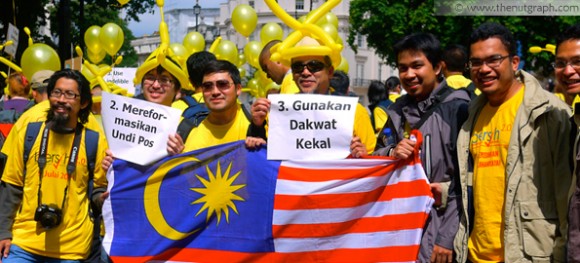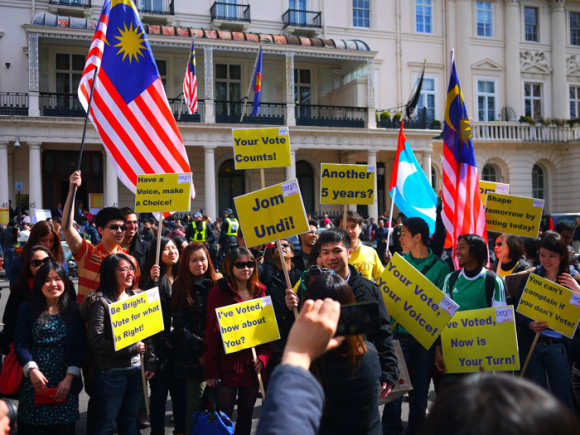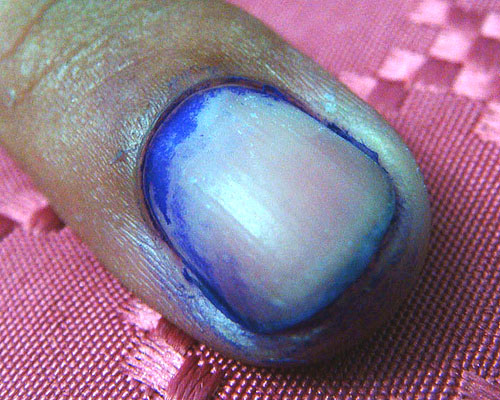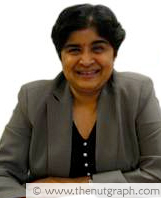THE Coalition for Clean, Free and Fair Elections (Bersih 2.0) had eight demands to ensure that the 13th general election since Malaya’s independence (GE13) would be democratic and legitimate in its outcome.
In the midst of the GE13 campaign, it is timely to critically review the state of these demands. To what extent have Bersih 2.0’s demands for a clean, free and fair election been met? What new measures have been introduced thus far as Malaysia heads to the polls on 5 May 2013, and are they good enough?

![]() Clean the electoral roll
Clean the electoral roll
The electoral roll is, at the very least, still marred with irregularities and plagued with errors. The Malaysian Electoral Roll Analysis Project (Merap) continues to uncover and highlight discrepancies in the electoral roll. The latest revelation on 19 April 2013 disclosed that there were 900 voters with the name Fatimah binti Ibrahim in Kedah, Kelantan, Pahang and Terengganu. Of the 900, there are 14 pairs sharing the same birthdays. And of these 14 pairs, 10 were from the same state.
The Election Commission (EC) has also not responded adequately to freshly arising claims by voters that they have been registered without their knowledge and consent. Complaints are also being received by Bersih 2.0 from voters who have voted before who now say that they can no longer find their names on the EC’s database of voters.
Some voters have also highlighted the fact that they have been moved from one constituency to another. The most celebrated case of this happening was when caretaker Selangor Menteri Besar Tan Sri Khalid Ibrahim found himself listed as a voter in the Federal Territory constituency of Lembah Pantai. He had hitherto been voting in Petaling Jaya Selatan.
More troubling were the testimonies at the royal commission of inquiry (RCI) in Sabah that foreign nationals had indeed been given Malaysian citizenship and registered as voters. According to the hearings, this was done to boost support for the ruling Barisan Nasional (BN) coalition.
![]() Reform the use of postal ballots
Reform the use of postal ballots
A large category of what used to be postal voters, comprising military and police personnel and their spouses, have now been recategorised as advance voters. They cast their vote on 30 April 2013.
Polling agents were allowed to observe the voting process. Registered voters who reside overseas have also been able to register as postal voters, and they voted on 28 April 2013 at the various Malaysian missions around the world.

However, the expected large increase in postal voters among Malaysians living abroad has not materialised for several reasons. Firstly, the regulations for absent voters was not finalised until quite recently. Secondly, the EC introduced a condition that only Malaysians living abroad who had returned to Malaysia for a cumulative period of at least 30 days in the five years preceding the dissolution of Parliament or state assembly would be eligible to be an absent voter. Thirdly, it ruled out postal voting for Malaysians living in adjacent countries like Brunei, Indonesia, Singapore and south Thailand. The EC also refused to countenance postal ballots for the many Sabah- and Sarawak-registered voters who work in peninsular Malaysia.
The further issue with postal voters is the fact that instead of decreasing the categories and number of postal voters, the EC has instead increased them. Postal voting was for the first time made available to media workers, EC staff, and security personnel who will be on duty on polling day. There will be up to 240,000 EC staff on duty on 5 May.
![]() Use of indelible ink
Use of indelible ink

The EC has agreed to the use of indelible ink. However, somewhat bizarrely, the marking will not be done after the voter has cast her or his vote. Instead, a voter’s left index finger will be marked with indelible ink at the time she or he is issued with the ballot paper. This has led to allegations that ballot papers could be smudged and possibly rendered invalid if such ink stains make a voter’s preference unclear.
There have also been troubling reports by advance voters that the ink can be washed off. The EC has responded but its explanation has yet to adequately allay fears and concerns that the ink will be ineffective in preventing double voting.
![]() A minimum 21-day campaign period
A minimum 21-day campaign period
Clearly this demand has not been met, since the campaign period in this general election has been fixed at 15 days. This is a modest increase of one day from the campaigning period for the 2008 general election.
![]() Free and fair access to media
Free and fair access to media
This has clearly not happened. In terms of the broadcast media, the federal opposition parties were offered a 10-minute slot to present their manifestos by the Information, Communications and Culture Ministry. This should be compared and contrasted with the more than one-hour live coverage that was given to the BN to launch its manifesto.
Aside from the manifesto launches, the traditional media have been publishing and broadcasting commercials that promote the governing coalition and demonise the Pakatan Rakyat (PR). At the same time, at least one traditional press, The Star, has rejected PR ads despite carrying numerous BN ads that demonise the opposition.
![]() Strengthen public institutions
Strengthen public institutions
The Registrar of Societies’ attempt to thwart the DAP before nomination day has continued to cement in the public’s mind that public institutions are neither neutral nor politically impartial.
Long before nomination day, there were also numerous reports of the police not taking any action when political violence occurred, mostly at opposition party events. The police investigation of Tindak Malaysia for possibly undermining parliamentary democracy through their voter-education programmes has also firmed up suspicions that the police are not neutral.

Of course, when it comes to public institutions, it is the EC itself which has lost public confidence. In one recent incident, an EC official attempted to stop Bersih 2.0 co-chairperson Datuk Ambiga Sreenevasan from speaking at a church in Seremban.
![]() Stop corruption
Stop corruption
Caretaker Prime Minister Datuk Seri Najib Razak and leaders of BN component parties may have signed an election integrity pledge created by Transparency International (TI)-Malaysia.
That may not have accounted for much, because it wasn’t too long before TI-Malaysia accused Najib of breaking that integrity pledge. They alleged that the giving out of money, gifts, vouchers and the promise of new construction, increments, bonuses, low-cost housing, free water in Selangor, and the extension of entitlements to government retirees violated the terms of the pledge. Not surprisingly, the government-controlled media has not reported on this breach.
![]() Stop dirty politics
Stop dirty politics
Just before the election campaign started, news broke out of yet another sex video allegedly involving a senior PAS leader. The regularity in which such types of videos emerge is alarming. At the same time, the level of belief in the truth and credibility of such videos is now fairly low. It’s not surprising, then, that the nature of dirty tricks in the election campaign has moved towards increased use of politically connected thuggery and, in recent days, small incendiary devices.
As can be seen, the journey to achieving Bersih 2.0’s eight demands is still a long one. The work will no doubt continue even after GE13. The post-election environment and citizen engagement will be critical in determining to what extent these demands will be fully met. ![]()
Andrew Khoo is an advocate and solicitor in private practice, and an aspiring columnist and commentator.

